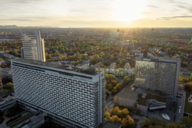
In 2020, congresses, trade fairs and conferences have been and are being held more and more digitally. The Westin Grand Hotel in Munich, which organised a two-day medical congress for about 400 participants in mid-October, shows that it can be done differently. The conference took place exclusively live and on site for all participants - with a specially developed hygiene concept and taking into account the applicable Corona safety measures. Both the organisers and the approximately 400 participants praised the event as a big success.
For 15 years, a medical congress with participants from all over Bavaria has been held every year at the Westin Grand Hotel Munich. This year, the organisers faced special challenges: The conference had to be planned in such a way that all current hygiene regulations, contact restrictions and social distancing rules were adhered to - and the visitors could still participate interactively in the conference.
For the Westin Munich, whose hotel manager trained as a DEKRA-certified hygiene officer at the beginning of the Corona pandemic, this was an exciting challenge, which the hotel mastered with its own hygiene concept and detailed planning.
The Westin Grand Hotel Munich at Arabellapark, which belongs to the Marriott Group, has a decisive advantage as a conference hotel: the hotel has 35 event rooms that can be divided into three separate areas on three different floors, each with its own entrances and exits. The hotel also has the event capacities of its sister hotel, the Sheraton Munich, directly opposite. In both hotels together, events for (in non-pandemic times) up to 1,250 guests can be held on more than 5,000m². These conditions made it possible to hold the medical congress in compliance with all distance and hygiene regulations. For this purpose, the number of participants was limited to a maximum of 200 per event room.
Together with the organiser of the congress and an event agency, the Westin Hotel worked out a hygiene concept tailored to the event, which contained more and more detailed measures than were required by law. They received support from the KVR Munich and the Bavarian Ministry of Health. The conference rooms in the hotel, which all have windows and sufficient fresh air supply, were additionally equipped with HEPA filters and humidifiers.
The hygiene concept envisaged dividing the total of 550 registered participants into four groups that would not meet during the event and whose paths would not cross in the building. Three groups were divided between the three separate event rooms at the Westin, while the fourth group attended the event from the Sheraton. Already upon arrival at the car park, there was an assigned area for each group and separate entrances to the hotel and the event rooms that could be reached directly from there.
At check-in (also spatially separate for each group), each participant was assigned a seat number, which they had for both the lectures and lunch. This seat allocation ensured that participants always had the same seat neighbour and that contacts between participants were reduced as much as possible. Each of the four groups also had its own service team that served lunch. The individual teams did not meet each other even in the Back of House due to separate walking routes.
During the meal, too, care was taken to reduce contacts as much as possible: When the guests arrived at the restaurant, the starters were already on the tables, only the main course was served by the service staff, and the dessert was then served to go. The usual buffets during coffee breaks were replaced by coffee and snacks "in a bag", which were provided at the seat to reduce contacts here as well. All meals were prepared and served in compliance with the strictest hygiene regulations.
The hygiene concept also included regulations such as the obligation to cover mouth and nose, defined walking routes, social distancing rules, regular disinfection of frequently used surfaces and the provision of hand disinfectant gel.
In terms of content, the congress traditionally consists of lectures, panels, workshops and an industry exhibition. All workshops, panels and lectures were transmitted by video to all event rooms this year, and questions could be asked via the chat. The industrial exhibition, where the haptic presentation of products is very important, was divided into different areas and floors so that participants could view and test part of the exhibition on site.
The participants as well as the organiser and the Westin Hotel rated the congress a full success. The participants perceived the additional security measures as very positive and did not feel restricted by them but safe during the entire event. The organiser and the Westin Hotel, who took on a considerable amount of extra organisational work to be able to implement the congress so successfully, succeeded in putting on a successful live event in Munich even in times of a pandemic.